 Petzlover
Petzlover Basset Fauve de Bretagne is originated from France but Komondor is originated from Hungary. Basset Fauve de Bretagne may grow 38 cm / 14 inches shorter than Komondor. Basset Fauve de Bretagne may weigh 42 kg / 92 pounds lesser than Komondor. Both Basset Fauve de Bretagne and Komondor has almost same life span. Basset Fauve de Bretagne may have less litter size than Komondor. Basset Fauve de Bretagne requires Low Maintenance. But Komondor requires High Maintenance
Basset Fauve de Bretagne is originated from France but Komondor is originated from Hungary. Basset Fauve de Bretagne may grow 38 cm / 14 inches shorter than Komondor. Basset Fauve de Bretagne may weigh 42 kg / 92 pounds lesser than Komondor. Both Basset Fauve de Bretagne and Komondor has almost same life span. Basset Fauve de Bretagne may have less litter size than Komondor. Basset Fauve de Bretagne requires Low Maintenance. But Komondor requires High Maintenance
 The Basset Fauve de Bretagne from France was introduced to the UK in 1983, and this smallest of the French hounds is rarely seen outside France, and when you do it is in Britain. This French hunting breed belonging to the Hound group in all likelihood descends from the Grand Fauve de Bretagne which is now extinct.
The Basset Fauve de Bretagne from France was introduced to the UK in 1983, and this smallest of the French hounds is rarely seen outside France, and when you do it is in Britain. This French hunting breed belonging to the Hound group in all likelihood descends from the Grand Fauve de Bretagne which is now extinct.
Long ago the dog was used for hunting and there was even a time when it was on the brink of extinction.The breed became very rare but was later bred with the Basset Griffon Vendeen as well as the Wire Haired Dachshund which has resulted in the breed we have today. The first Basset Fauve was imported into the USA in November 2001.
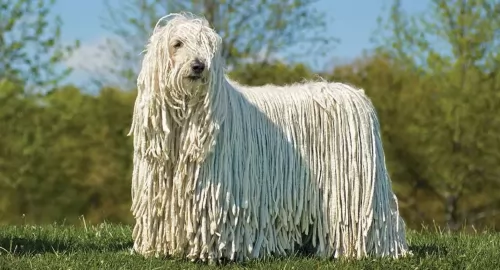 Looking like a giant mop, and sometimes being referred to as 'mop dogs' the Komondor, known also as the Hungarian sheepdog, hails from Hungary.
Looking like a giant mop, and sometimes being referred to as 'mop dogs' the Komondor, known also as the Hungarian sheepdog, hails from Hungary.
The dog was brought to Europe centuries ago so he is a well established breed. It has been declared as one of the country's national treasures.
He is a dog related to many other dogs such as the Pulim the Ovcharka, the Bearded Collie, Old English Sheepdog and others.
 The Basset Fauve de Bretagne is a smallish hound, with a long body and deep chest. He is lively and friendly. He is a wire-coated dog, looking similar to a golden cocker spaniel, but his coat is coarse and quite springy and wiry to the touch. He is nimble, he has plenty of courage, he is lively, friendly and amenable. He has short legs, but unlike other Basset breeds, these don’t have that crooked, turned outwards appearance that the Basset Hound has.
The Basset Fauve de Bretagne is a smallish hound, with a long body and deep chest. He is lively and friendly. He is a wire-coated dog, looking similar to a golden cocker spaniel, but his coat is coarse and quite springy and wiry to the touch. He is nimble, he has plenty of courage, he is lively, friendly and amenable. He has short legs, but unlike other Basset breeds, these don’t have that crooked, turned outwards appearance that the Basset Hound has.
The tail is fairly long and held upright when the dog is alert. He has long low-set ears which reach roughly to the end of the nose. The coat is always wheat- or fawn or red in color. The Basset Fauve de Bretagne, also referred to as the Fawn Brittany Basset isn’t quite as low to the ground as the Basset Hound, measuring 32 – 38 cm.
Small, stocky and feisty, this rough-coated Basset is energetic, agile and quick and you’ll find that he gets on well with children as well as other pets in the house. Some training and socialization will go a far way to make him an even more super dog than what he is. He’ll make a wonderful family pet and will adapt well to country living as well as living in the city, if he can rely on you to take him for walks.
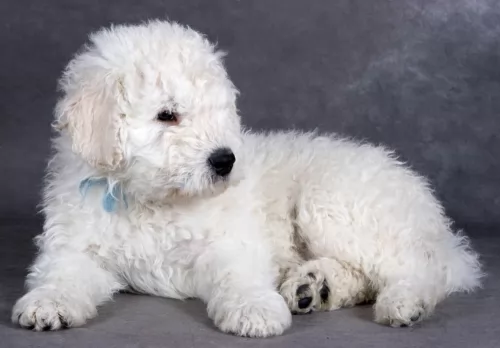 Known for his unique long corded, singular white coat, the Komondor, a molosser dog, is large. Females start at 64cm in height and both males and females can reach up to 76cm in height.
Known for his unique long corded, singular white coat, the Komondor, a molosser dog, is large. Females start at 64cm in height and both males and females can reach up to 76cm in height.
This unusual coat of theirs is wavy and actually forms cords or dreadlocks as the dog matures. You can't easily see the dog's face because of all the hair.You also can't see the tail easily, in fact you might think he hasn't got a tail as it is obscured by the hair. The tail is medium length and held low.
He has a large head, dark brown eyes, and floppy ears. The coat is certainly going to require grooming even though the dog doesn't shed much. His body is robust and well muscled with the body being slightly longer than the height of the dog.
The Komondor has been a dog used for guarding livestock, and while his character is calm and balanced, when the livestock is threatened, he can show another side – more aggressive – as he defends his flock. He makes an excellent watchdog.
He is an affectionate dog with his human family, being a gentle playmate of children. He is slightly reserved and wary of strangers, and is willing to guard and protect his human family from them.
He is also good with other family pets. When you look at him you might think of him as not being very energetic, but he is an athletic dog, fast and powerful. Because of his size and speed, it is best to have him trained and socialized as he can be obstinate. Training him makes him obedient.
 Smart and courageous, the Basset Fauve is such a wonderful pet to have in your home. He is gentle, loving and loyal and will adapt to living in the countryside or the city, so long as he is loved, fed well, exercised and given lots of attention.
Smart and courageous, the Basset Fauve is such a wonderful pet to have in your home. He is gentle, loving and loyal and will adapt to living in the countryside or the city, so long as he is loved, fed well, exercised and given lots of attention.
He was once a serious hunter, but these days he is most content to be friend and protector for his human family.
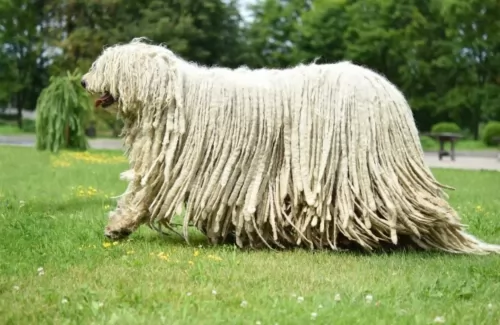 The Komondor is known for his strong guardian characteristics, especially with his human family. He is loving and loyal towards them while being wary of strangers.
The Komondor is known for his strong guardian characteristics, especially with his human family. He is loving and loyal towards them while being wary of strangers.
True, his coat can make people think twice before making this dog a pet, but if you're game and ready to attend to his coat, he can make an excellent family pet. They're fine with other pets too, and he is also an intelligent dog, capable of being easily trained.
He needs a good deal of exercise and can become noisy and destructive without the right amount of stimulation. If you do your part with the Komondor and provide him with a loving, caring home, he will be an awesome pet and guard you with his life.
 The Basset Fauve is free from inherited health problems in the UK and is in fact one of the hardiest of the Basset group. Like all Basset type breeds, as a dog owner you’ll have to keep an eye on your Basset Fauve as he can develop back problems as he gets older.
The Basset Fauve is free from inherited health problems in the UK and is in fact one of the hardiest of the Basset group. Like all Basset type breeds, as a dog owner you’ll have to keep an eye on your Basset Fauve as he can develop back problems as he gets older.
When it comes to your Basset Fauve’s health, make sure he gets all his shots, starting from when he is a puppy. Many of the dangerous canine diseases can be prevented with vaccines.
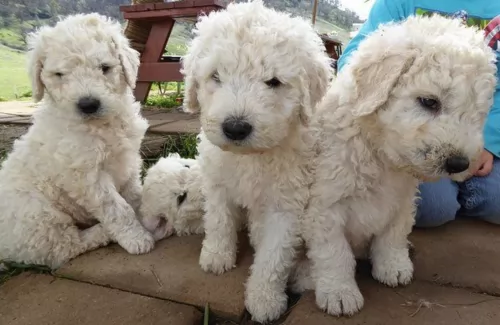 The Komondor is a healthy dog breed who can live to be 10, 11 or 12 years if you look after him well. There aren't any known genetic disorders prominent with the dog, but it pays to know about some of those that could strike -
The Komondor is a healthy dog breed who can live to be 10, 11 or 12 years if you look after him well. There aren't any known genetic disorders prominent with the dog, but it pays to know about some of those that could strike -
This is an irritating eye problem where the eyelash rubs up against the eyes.The result can be scratching of the cornea and eye infections. It is an eye problem which can be corrected with surgery.
Hip dysplasia is a serious genetically inherited disorder and common in large dog breeds. It is caused by a malformation of the hip joint. It can cause problems for the dog, weakening the hip and making it incapable of supporting the weight of the dog.
It also leads to pain for the dog, difficulty with moving and even total lameness. Weight, size of dog, age and genetics are all factors which can increase the dog's likelihood of developing hip dysplasia.
Whimpering, lethargy and refusing to put weight on the leg are common signs of hip dysplasia and your vet will go ahead with ways to relieve the pain and symptoms of your Komondor.
 The Basset Fauve is easy to maintain, and all that is required from you is to brush his wiry coat at least twice a week to remove all loose hairs. Look out for too much hair in the ear passage and remove it. The teeth should be brushed a couple of times a week with a dog toothpaste and brush to avoid plague build-up and the claws should also be trimmed.
The Basset Fauve is easy to maintain, and all that is required from you is to brush his wiry coat at least twice a week to remove all loose hairs. Look out for too much hair in the ear passage and remove it. The teeth should be brushed a couple of times a week with a dog toothpaste and brush to avoid plague build-up and the claws should also be trimmed.
Daily walks will be imperative for your Basset Fauve as he is an energetic dog and will need regular exercise. Just ignoring his energetic side will make him frustrated, bored and even destructive.
This breed of dog used to hunt small game and so he is lively and energetic. Because of this he will need a high-quality dog food. Always buy the best commercially manufactured dog foods and speak to your vet about the best one, and whether dry- or wet foods would best suit your canine friend. You want to provide your pet with variety, and it is imperative to include some raw- and cooked meat to his regular dog food to ensure he doesn’t battle with an itchy, dry skin.
Dog foods suited to age, activity levels and stage of life can ensure your dog is always energetic, full of life, healthy and happy and not prone to putting on weight. Always ensure that clean, cool water is constantly available to your pet.
If you get a puppy from a reputable breeder, they will tell you what the puppy’s feeding schedule has been. Make sure to stick to the same routine for a while so that your puppy doesn’t have any tummy upsets.
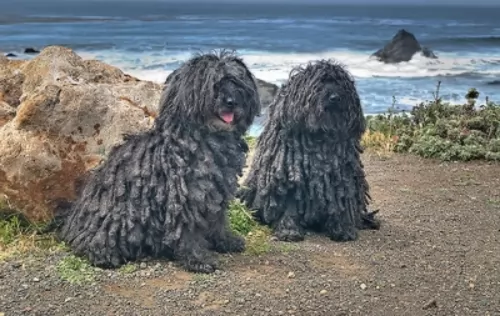 The Komondor is most certainly not a low maintenance dog with that extraordinary coat.Before the dog turns 1, the coat begins to form its cords. These cords can become discolored and matted, In fact the cords will need to be separated to keep the dog clean and free of matted hair.
The Komondor is most certainly not a low maintenance dog with that extraordinary coat.Before the dog turns 1, the coat begins to form its cords. These cords can become discolored and matted, In fact the cords will need to be separated to keep the dog clean and free of matted hair.
For those who keep the dog as a pet and who don't want him to be a show dog, he can be trimmed, otherwise the coat and its maintenance could turn out to be a real issue.
Of course once the distinctive coat has been sheared, he loses that typical and recognizable Komondor look.
Check his ears on a regular basis for wax- and dirt buildup so as to prevent ear infection.
Teeth need to be checked regularly to prevent tartar buildup and if you don't have the time or the knowledge to keep his teeth clean and maintained, take him to the vet as the teeth-treatments they do there will promote healthy teeth and gums.